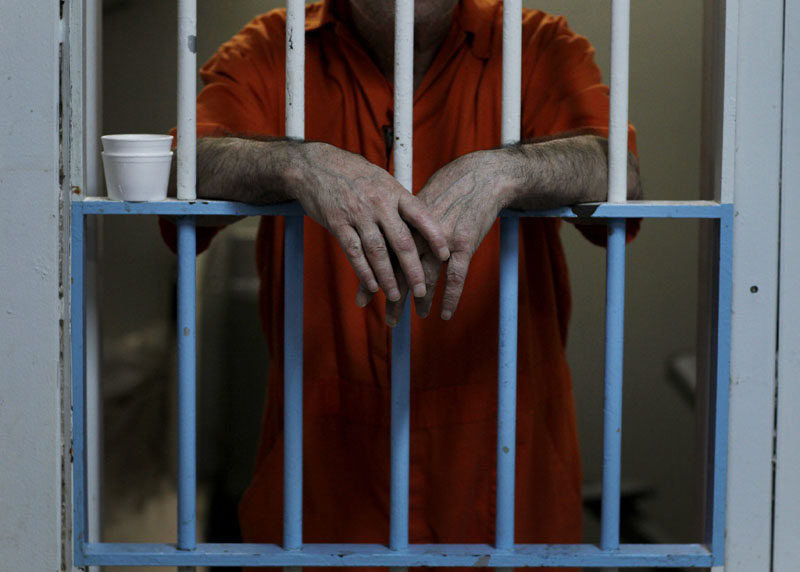Ottawa plans to mostly phase out holding immigration detainees in provincial jails, Public Safety Minister Ralph Goodale told reporters Wednesday in Ottawa.

“(It) is entirely inappropriate to mingle people who are having an immigration or refugee issue with people who have been convicted of criminal offences,” he said.
“Can I say that we will stop it altogether? I can’t honestly make that comment now. But dramatically reduce it? Yes. That is the objective.”
Details of the planned reforms will probably be announced later in the year, spokesperson Scott Bardsley told Global News.
“That’s the hope — it’s not a commitment to do it by then,” Bardsley said.
Remaining use of traditional jails for immigration detainees would be in parts of the country far from the three immigration holding facilities, in Vancouver, Toronto and Montreal, Bardsley said.
“If you cross the border in the south of Saskatchewan, you can’t be transferred to the Toronto or Vancouver facility.”
Instead of jail, the Canada Border Services Agency would make more use of purpose-built immigration holding centres, where conditions are more humane, or bail.
The practice of jailing immigration detainees, many of whom are people with no criminal background who have been held for administrative reasons, has been widely criticized for many years.
It is most common in Ontario, where the CBSA pays the provincial government to use space in their jails. At any given time, about 220 immigration detainees are held at the Central East Correctional Centre in Lindsay, Ont., a maximum-security facility.
READ MORE: Cold, ill-fed, terrified: Ex-detainee recalls Lindsay jail ordeal
“I’ve shared ranges with people who were there for break and enter, molestation, attempted murder — these individuals are being kept in jails with innocent immigrants,” Gambian refugee claimant Muhammed Sillah remembered of his four and a half months in Lindsay.
“It was all about watching your back, all the time. There were always threats around, and there was always intimidation.”
Sillah spoke to Global News in late 2014. His refugee claim was rejected, but he felt his life would be in danger if he was deported to Gambia because in Canada he had been an outspoken critic of the government there. Held as unlikely to appear for deportation, he was eventually released after a spousal sponsorship application was approved.
Winter cold made it “really difficult to sleep at all, or concentrate,” and inadequate food “made the stronger ones prey on the weaker ones,” he remembered.
According to the Immigration and Refugee Protection Act, CBSA can detain someone if they believe they’re unlikely to appear for immigration proceedings, they’re a danger to the public or if there is uncertainty about their identity.
“There is a fundamental, systemic problem with using provincial correctional facilities designed for persons detained under the Criminal Code, to detain immigrants who are neither criminally-charged nor serving a sentence,” Ontario Human Rights Commissioner Renu Mandhane wrote in April. “It would appear that provincial correctional facilities have neither the infrastructure nor the staff expertise to handle immigration detainees in a way that accommodates their unique needs.”
Uncertainty about when their imprisonment will end has devastating effects on migrants’ mental health, a report released last year by the University of Toronto’s law school said.
READ MORE: Public safety minister wants to end jailing of child migrants, increase CBSA oversight
The report described “the utter despair that this regime produces among detainees held in provincial jails. Each of the immigration detainees we met with communicated incredible hopelessness: ‘nobody cares because I am an immigrant here;’ ‘we have no rights;’ ‘they look at us … like criminals;’ ‘they treat us like garbage;’ we are ‘not treated like humans.’ This anguish is compounded for detainees with mental health issues, who feel further marginalized and discriminated against on account of their health needs.”
The practice of jailing immigration detainees with inmates with criminal backgrounds, often in the same cell, violates international law, a report prepared for the federal government by the Canadian Red Cross argued last year. It is physically dangerous, “extremely stressful” and “… a particular concern for refugee claimants who may have experienced armed conflict, torture, and other traumatic experiences.”
In May, 113 lawyers and law professors wrote an open letter to then-Ontario correctional minister Yasir Naqvi urging him to end Ontario’s agreement with the CBSA, saying that there were “very serious human rights and rule of law concerns at stake.”
Their letter followed one written by 140 health care workers in which they said that “… incarceration in prisons often has a profound and debilitating impact on persons with suicidal ideation. In fact, the standard procedure for dealing with persons with suicidal ideation in custody is placement in near or complete isolation and sometimes in solitary confinement. These placements may indeed cause a suicide rather than prevent it.”
Three immigration detainees have died in custody since the beginning of the year, two in Ontario and one in Alberta.
With files from Leslie Young
VIDEO: MacDonald Scott is the immigration consultant for Michael Mvogo, an African man who’s been held in detention in Canada for more than eight years. Authorities say they can’t release Mvogo because they cannot confirm his identity, and no country has agreed to accept him.




Comments